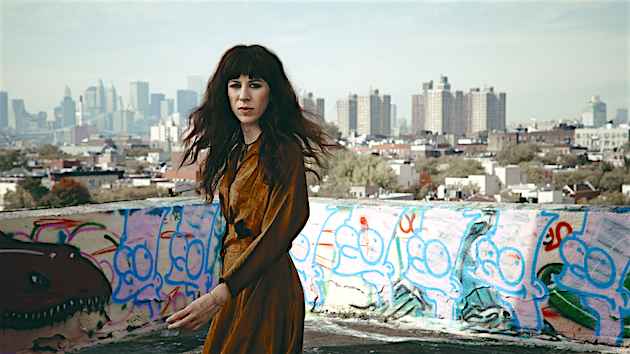
So far in her impressive career, the music of composer Missy Mazzoli has mostly defied labels. Categorizations like “multimedia” or the more flattering “dynamic amalgamation” carry little weight with the 37-year-old New Yorker, who grew up in rural Pennsylvania and spent a lot of time “driving around the suburbs listening to all kinds of music. I grew up in a very nonmusical family,” she says speaking on the phone with SFCV from Greenwood Music Camp in Massachusetts. “We had a piano and I fell in love with classical music but was not steered in any particular direction. To me it’s a natural outgrowth of all of my interests. Whatever the piece requires I can pull from this toolbox of influences.”
Regarding her time at camp, she says, “I love teaching/helping students who are young, especially 13 to 19, those tumultuous teenage years. Those are the years when you decide to be a composer, or to devote your life to music. There are exceptions, but usually that’s the time.” Next week, she heads to Santa Cruz, where the West Coast premiere of her orchestral piece Sinfonia (for Orbiting Spheres) will anchor a program at the Cabrillo Festival of Contemporary Music on August 12.
Mazzoli’s own education resulted in degrees from Yale and Boston Universities, as well as the Royal University of The Hague. “I wanted to get a perspective on America from far away,” she explained. “I always wanted to build a musical career in America, New York, specifically. But I wanted to get an idea of how American music fits into worldwide culture.”
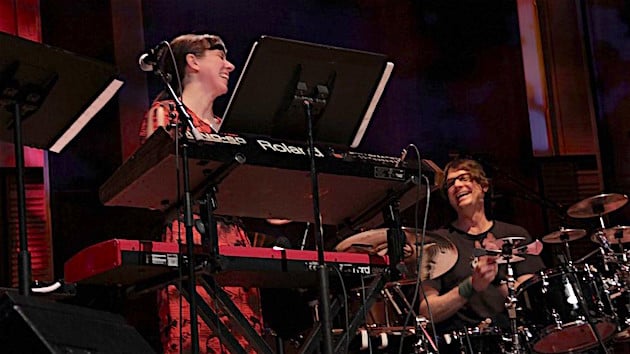
Mazzoli’s musical accomplishments include a notable performance career with her own ensemble, Victoire, and premieres of a variety of works with classical organizations from Opera Philadelphia (Breaking the Waves, 2018) to the L.A. Philharmonic (Sinfonia, 2014), as well as collaborations with more cutting edge performers and composers such as percussionist Glenn Kotche (Vespers for a New Dark Age, 2014) and cellist Maya Beiser (Salt, a “mini-opera,” 2012). Currently on the faculty of Mannes College of Music, Mazzoli makes for a new kind of role model, a working female composer who is creating works on her own terms and receiving prestigious commissions and high praise from top critics. Recently, Anne Midgette of The Washington Post dubbed her “less a black sheep than a sacred cow: the ‘it’ girl of the contemporary scene.”
“My friends made fun of me so much for that,” Mazzoli says, laughing. “Sacred cow is not always a compliment. I don’t think she meant anything negative, but...I feel extremely lucky in that I keep having opportunities to make more work. I’m interested in success from the point of view that it allows me to help more young people and to make more work. I’m still in a position where I have to finance my own recordings, and I’m reinvesting a lot back into my own work, but I’m grateful to have those resources to invest.”
Can she find any label for her work that doesn’t chafe?
“I really can’t. Any label falls flat and is incomplete, certainly something that relates to an earlier time. ‘Post-minimal’ is so long before I was even born. I have been inspired a lot by minimalists and the way they perform, but I am not a minimalist, I am not a post-minimalist. I wish there were a word. I’m very comfortable with the word composer. But I don’t even like to call the work classical. I just try to talk enough about the story behind the work to get people interested.”
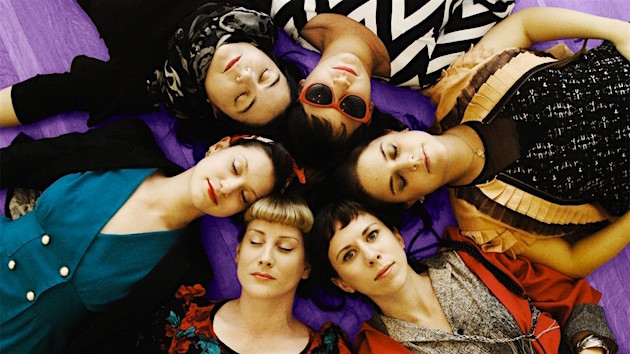
Like composers Steve Reich, Phillip Glass, and Meredith Monk, Mazzoli’s performing ensemble has been an important part of her creative development and profile. “With Victoire I knew that we were trying to do something that was new, but not totally new. Steve Reich, Phillip Glass, Meredith Monk, [and] Bang on a Can have been doing this for decades. From early on we’ve been playing at house concerts, at bars, at pop music festivals, so you inevitably end up in situations where you’re not an easy fit, but we learned how to deal with it, for better or worse. We tried not to compromise our sound so much, but what can you do? It happens.”
Mazzoli makes her home in Greenpoint, Brooklyn, and maintains a disciplined early morning work process. “I’m always picturing opera as I’m writing it,” she says. “I’m acting out the scenes in my studio by myself and you have to do that to get a sense of the timing.”
Mazzoli’s operatic works have drawn upon various kinds of source material, from Boccaccio’s The Decameron for A Flourish of Green (2013) to the diaries of Swiss explorer Isabelle Eberhardt for Songs from the Uproar (2012), and the 1996 Lars von Trier film for this year’s Breaking the Waves. All of the operas have been well received, and if they can be said to have a common theme, Mazzoli says, “all of my work, whether operatic or instrumental, is about people. At the core, I’m interested in human beings, their struggles as they try to connect, how they hurt each other, or help each other. I find myself drawn to fascinating and powerful women, and women who find power in interesting and unconventional ways in a world that has not typically offered them an obvious path to power, or a sense of self. All three of my operas have at their core these very strange and strong female characters.”
Breaking the Waves, which was developed in residency in Philadelphia, was a collaboration with playwright and librettist Royce Vavrek, who wrote the libretto for Chinese composer Du Yun’s Pulitzer Prize-winning opera, Angel’s Bone. “I’m planning two new operas with Royce Vavrek and they’re both with massive orchestras,” Mazzoli says. “But I can’t say too much more about that. And I’m always looking for ways to keep performing. I’ve been performing with the violinist Jennifer Koh and we’re making an album together (which will be released on the Cedille label) and I still work with all the ladies of Victoire.”
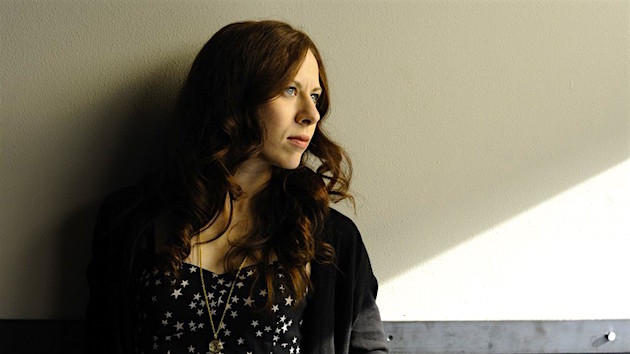
Speaking about Breaking the Waves, she says, “I knew I was writing for Kiera [Duffy, soprano] before I started writing. That’s essential. It helps to have a specific person in mind.” Currently she is working on her first ballet, a 50-minute work with choreographer Robert Binet for the National Ballet of Canada. The company is planning a workshop next week. “This is the first ballet I’ve ever done,” she says, “so the purpose of the workshop next week is for me to see the movement, so I can visualize the piece, the way I do with my operas.”
Some critics compared Breaking the Waves to Britten, and Mazzoli acknowledges Britten as an influence. “For my operatic work, Britten is a very big influence, especially for Breaking the Waves. I was writing this story about an outcast in a northern U.K. coastal town, so that is like Peter Grimes, which is one of my favorite operas. And a work like Turn of the Screw, which is dealing with ghostly figures and the perils of childhood, that was a big influence for my third opera, Proving Up [2018, libretto by Vavrek.] The clarity of his orchestration and his way of dealing with harmony is all very appealing to me. I love it.”
Asked if she had any words to entice traditional opera audiences to her work, which sometimes includes electronic instruments or other nonclassical elements, she says, “Honestly, I feel this sort of aversion to amplified music is something people have been told to feel. I don’t understand it at all. Some operas should be amplified some shouldn’t. People can react to bad amplification, but wholesale rejection of it, I don’t understand. Have opinions. Say, ‘That’s too loud for me.’ It’s fine not to like this stuff, but there is such a range, so many different kinds of electronic music. The ballet I’m working on, it’s the Orpheus story and starts with a mashed-up version of a recording of Gluck’s Orfeo. It would be a shame to just reject that. To me it’s a natural dramatic tool.”
Works by new composers are more and more often having additional performances as opposed to simply a premiere followed by oblivion. Heggie’s Dead Man Walking has seen many revivals, as have some of Mazzoli’s works. And Mazzoli agrees that times have changed for composers. “There was a postwar feeling that things should not be romantic, people moving away from a romantic aesthetic to something colder and more calculated, both in the music and in attitude to the audience as a whole. That attitude doesn’t relate to our contemporary culture. I see why it happened, but I don’t find it interesting as a way to move forward for myself. My mission is to connect with people. The purpose of creating music is to feel less alone, to create a community around the work to express something that can’t be expressed in words.”
Mazzoli’s ambitions in the past have included asking big questions such as, “Why do I feel compelled to write music? Where does my music fit in with the world at large? How can I address these issues swirling around me without being ham-handed or preaching to the choir? What is the role of opera in dealing with these issues?”
And she still holds strongly to those ideas.
I try not to get too limited in my worldview. A lot of the ways composers talk about their own work can be very limiting, as if we’re still in that time where our only audience is other composers. There is such potential, especially with everything that is going on in opera, to reach a broader audience and, more importantly, to this idea of reflecting on the world around us in a unique way.
I’m always trying to connect my work not only with other art forms, but with what is resonating in the popular consciousness. My third opera, Proving Up [2018, based on a short story by Karen Russell and premiered at Washington National Opera] is all about the American dream and it’s a sort of surreal reflection on the origins and the reality of the American dream, and that came as a direct result of what this country has been going through in the last two years. What is the reality versus these myths that we continue to tell ourselves? I think music is more interesting when it comes from that place. Composers are citizens in the world and they’re not exempt from that.
Asked what she might say to a 15-year-old aspiring musician who, like her younger self, did not necessarily fit in, she says, “Compare and despair. Cut yourself a break. It’s a very common thing to compare yourself to other people, we all do it. We all feel jealousy at any age. The most successful composers still feel jealous of their peers. So part of being an artist is to cut yourself a break.
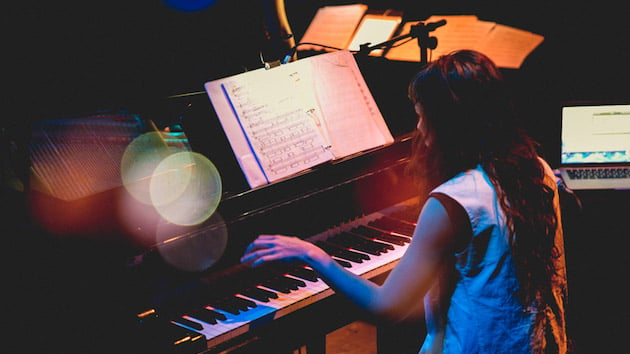
“Remember that the thing that makes you different from everybody else is the thing that will make you stand out in a good way. It’s the gist of what Martha Graham said to her dancers, that there is a story to be told through you and only through you, and if you squash that that story will never be told to the world. That’s really true of composers. Everybody has this unique blend of influences and obsessions and abilities. Even a lack of ability can force you to do something in an unconventional way, so try to pay attention to that and take it as far as you can.
“Also, don’t hang out with people who make you feel bad. Fifteen is an age where people are so insecure they will do anything to make you feel less than, so hang out with people who make you feel energized.”




